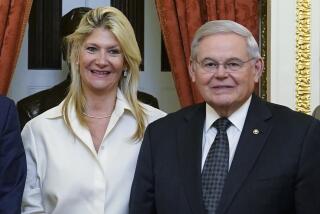Nofziger Indictment Has 6 Ethics Counts
- Share via
WASHINGTON — Lyn Nofziger, former White House director of political affairs and a longtime aide to President Reagan, was charged in an indictment made public Friday with six counts of illegally contacting government officials on behalf of the scandal-plagued Wedtech Corp. and other companies.
The federal grand jury also accused Mark A. Bragg, Nofziger’s partner in a public relations company, of aiding and abetting one of the illegal contacts.
The indictment, which had been returned under seal Thursday, charged that Nofziger illegally lobbied Atty. Gen. Edwin Meese III when Meese was a White House counselor; Meese’s then-deputy James E. Jenkins; Secretary of the Army John Marsh Jr.; and Small Business Administration chief James C. Sanders on behalf of his clients.
Proclaims Innocence
Nofziger, who began his Washington public relations business immediately after resigning from the White House in 1982, insisted in a statement that he was “innocent of any deliberate violation of the law.”
He charged that independent counsel James C. McKay, who directed the grand jury, has “systematically ruined my good name, my business and my finances . . . at the expense of justice and fair play.
” . . . If the independent counsel wants my scalp, he will have to get it the old-fashioned way,” he said.
Bragg, a businessman who met Nofziger in California before Reagan’s 1980 election, said through his attorney that he also will plead innocent. “He is only charged with one count and had no intent to violate the law,” said attorney Richard Ben-Veniste.
The indictment charged that Nofziger violated provisions of the Ethics in Government Act that limit lobbying activities by federal officials after they leave government service. He was accused of violating a 12-month ban on lobbying former colleagues on any matter and--in representing Wedtech--violating a lifetime ban on lobbying government officials on matters in which he had “personally and substantially” been involved while in government work.
Year at White House
Nofziger worked in the White House from January, 1981, to January, 1982. Bragg never has worked for the government.
The indictment charged that Nofziger made at least two illegal approaches to former White House colleague Jenkins in 1982 to help Wedtech and another client, the National Marine Engineers Beneficial Assn. For the marine union, he was allegedly trying to influence the White House to expand the use of civilian seamen on government ships.
For Wedtech, a now-bankrupt defense contracting firm in New York, he allegedly promoted a request for a $31-million engine contract from the Army.
The contact with Jenkins on behalf of Wedtech had been disclosed earlier in the investigation, but the indictment cited another contact that was not previously known. It said Nofziger wrote to then-White House counselor Meese on April 8, 1982, to solicit his aid in getting the contract for Wedtech.
Those contacts inside the White House violated the 12-month lobbying ban, the grand jury said.
Violated Lifetime Ban
Other lobbying contacts with the Army’s Marsh and the SBA’s Sanders for Wedtech violated the lifetime ban, the indictment said, because Nofziger, while in the White House, had “participated personally and substantially (in Wedtech matters) through decision, approval, recommendation (and) the rendering of advice.”
It said the company lobbied the political director in 1981, and he had decided to promote it for political reasons because Wedtech was then a small, private company owned by a Puerto Rican immigrant in the South Bronx and the Administration was eager to show it understood the needs of minority businessmen. In a speech, President Reagan later cited the firm as an example of minority enterprise.
After Nofziger’s letter to Meese, a meeting was held at the White House on the Wedtech bid, with Jenkins presiding. Also present were Bragg, Wedtech executives and officials of the Army and Small Business Administration, which administers the no-bid minority contract program. Wedtech ultimately won the contract over initial objections by the Army that its bid was too high.
Meese, now attorney general, is himself under investigation by McKay over his relationship with Wedtech. That investigation is not expected to be completed for several months. He has denied any wrongdoing and asserted he only helped the company get a “fair hearing” on its contract request.
Earlier this year, four former Wedtech executives pleaded guilty to having paid bribes and other illegal gratuities in an effort to influence the government to award contracts to the firm. A grand jury in New York is continuing that phase of the investigation.
Received Stock
Although the grand jury here did not mention it, authorities have said that Nofziger and Bragg each received 22,500 shares of Wedtech stock in 1983, the equivalent of $350,000 in fees. These fees have not been characterized as illegal, however.
Another count in the indictment said Nofziger illegally lobbied White House officials in 1982 on behalf of another defense contractor, Fairchild Industries Inc., of Chantilly, Va. Nofziger’s aim was to promote funding for Fairchild to produce more A-10 attack aircraft for the Air Force.
If convicted on all counts, Nofziger could face maximum punishment of 12 years in prison and $60,000 in fines.
Paul L. Perito, Nofziger’s attorney, told reporters that Nofziger had routinely received legal advice from a Washington attorney, Stanton D. Anderson, about his lobbying activities and thus had not intentionally violated any ethics laws. Anderson has also done lobbying work for Fairchild.
“Mr. Nofziger acted fully in accord with what he understood the legal advice to be,” Perito said at a news conference in his office. “He did not deliberately violate any tenet of the Ethics in Government Act.”
Attempts to reach Anderson for comment were unsuccessful.






